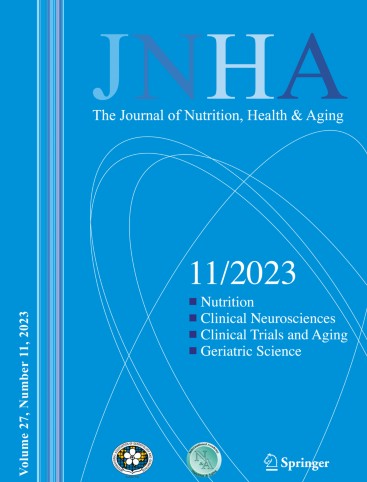Cognitive function differs across healthy lifestyle behavior profiles: a 10-year population-based prospective cohort study
IF 4.3
3区 医学
Q1 GERIATRICS & GERONTOLOGY
引用次数: 0
Abstract
Background
Modifiable lifestyle behaviors significantly influence the risk of cognitive impairment. However, the cumulative effects of multidimensional lifestyle profiles on cognitive function remain poorly understood, as most studies examine individual lifestyle behaviors in isolation. This study aimed to identify distinct profiles of individuals based on healthy lifestyle behaviors and to examine associations between these profiles and cognitive function in older Chinese adults.
Methods
We used a prospective cohort, including 5381 participants of the Chinese Longitudinal Healthy Longevity Survey (CLHLS) between 2008 and 2018, aged 65 years and older with normal cognition at baseline. Questionnaires were used to collect self-reported data on healthy diet, sleep quality, physical activities, cognitive activities, and social activities. Repeated measures of the Mini-Mental State Examination (MMSE) were utilized to assess cognitive function. Latent Profile Analysis (LPA) was conducted to identify profiles characterized by similar characteristics of lifestyle behaviors. The resultant profiles, were then used to further explore associations with cognitive function using cox proportional hazard regression and linear mixed models.
Results
During a 10-year follow-up period, 2017 (37.5%) out of 5381 participants developed cognitive impairment. Three latent profiles were identified: (1) “active engagement” (n = 347, 6.4%); (2) “moderate engagement” (n = 627, 11.7%); and (3) “negative engagement” (n = 4407, 81.9%). Compared to negative engagement, the active profile had the lower risk of cognitive impairment (HR = 0.693, 95% CI: 0.553−0.868), longer years to develop cognitive impairment (mean = 7.818, range: 6.701, 8.935) and slower rate of annual cognitive decline (0.407 points per year). Similarly, the moderate engagement profile had the lower risk of cognitive impairment (HR = 0.781, 95% CI: 0.664−0.919), longer years to develop cognitive impairment (mean = 7.541, 95%CI: 6.464, 8.619) and slower rate of annual cognitive decline (0.297 points per year) compared to negative profile. Subgroup analysis revealed that there were no significant differences observed across any of the subgroups, including age, gender, year of schooling, marital status, residence, live alone, family economic status.
Conclusions
These findings imply the likelihood of an inverse correlation between the levels of engagement in healthy lifestyle behavior and the risk of cognitive impairment. Even adopting a few healthy lifestyle habits is superior to none at all, underscoring the value of lifestyle modifications for cognitive health.
认知功能在健康生活方式行为档案中有所不同:一项基于人群的10年前瞻性队列研究
背景:可改变的生活方式行为显著影响认知障碍的风险。然而,多维生活方式对认知功能的累积影响仍然知之甚少,因为大多数研究都是孤立地考察个人生活方式行为。本研究旨在确定基于健康生活方式行为的不同个体特征,并研究这些特征与中国老年人认知功能之间的关系。方法:采用前瞻性队列,纳入2008年至2018年中国纵向健康寿命调查(CLHLS)的5381名参与者,年龄在65岁及以上,基线认知正常。调查问卷用于收集有关健康饮食、睡眠质量、体育活动、认知活动和社交活动的自我报告数据。使用简易精神状态检查(MMSE)的重复测量来评估认知功能。进行潜在剖面分析(LPA)以识别具有相似生活方式行为特征的剖面。然后使用cox比例风险回归和线性混合模型进一步探索与认知功能的关联。结果:在10年的随访期间,5381名参与者中有2017人(37.5%)出现认知障碍。发现了三个潜在特征:(1)“积极参与”(n = 347, 6.4%);(2)“适度参与”(n = 627, 11.7%);和(3)“消极参与”(n = 4407, 81.9%)。与消极投入相比,积极投入的认知障碍风险较低(HR = 0.693, 95% CI: 0.553-0.868),认知障碍发生时间较长(平均= 7.818,范围:6.701,8.935),年认知能力下降速度较慢(每年0.407点)。同样,与消极的工作状态相比,中度工作状态的认知障碍风险较低(HR = 0.781, 95%CI: 0.664-0.919),发生认知障碍的时间较长(平均= 7.541,95%CI: 6.464, 8.619),年认知能力下降速度较慢(每年0.297点)。亚组分析显示,包括年龄、性别、受教育年限、婚姻状况、居住地、独居、家庭经济状况在内的任何亚组之间都没有显著差异。结论:这些发现暗示了参与健康生活方式行为的水平与认知障碍风险之间可能存在负相关。即使养成一些健康的生活习惯也比没有好,这强调了改变生活方式对认知健康的价值。
本文章由计算机程序翻译,如有差异,请以英文原文为准。
求助全文
约1分钟内获得全文
求助全文
来源期刊
CiteScore
7.80
自引率
3.40%
发文量
136
审稿时长
4-8 weeks
期刊介绍:
There is increasing scientific and clinical interest in the interactions of nutrition and health as part of the aging process. This interest is due to the important role that nutrition plays throughout the life span. This role affects the growth and development of the body during childhood, affects the risk of acute and chronic diseases, the maintenance of physiological processes and the biological process of aging. A major aim of "The Journal of Nutrition, Health & Aging" is to contribute to the improvement of knowledge regarding the relationships between nutrition and the aging process from birth to old age.

 求助内容:
求助内容: 应助结果提醒方式:
应助结果提醒方式:


